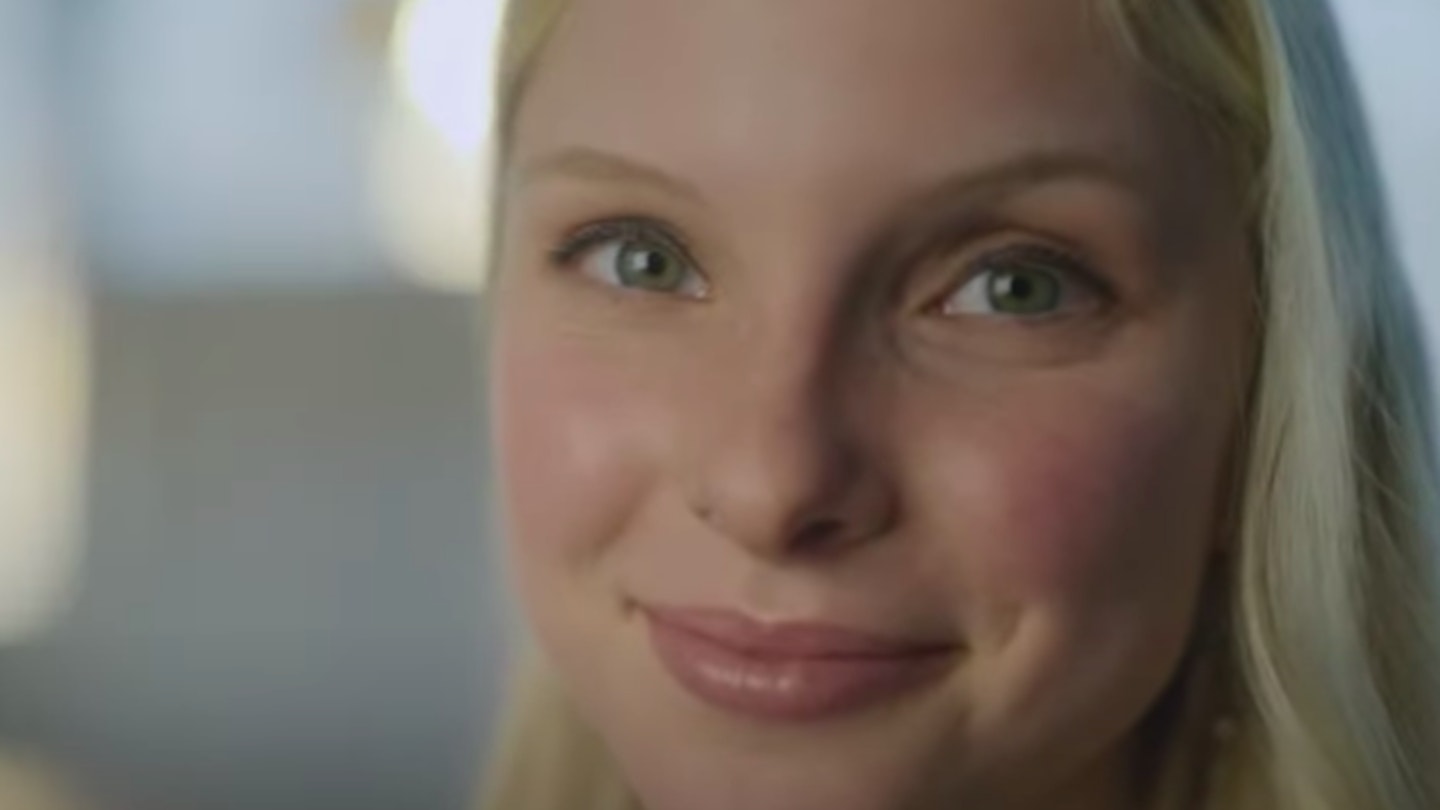Trigger warning: Eating disorders
When I watched the latest advert from beauty brand Dove this week, the moment my heart really started to ache was when Mary, the beautiful young girl whose story the ad focuses on, opens her very first mobile phone on her twelfth birthday. Why? Because as the mother of an almost-13-year-old girl, I know what happens next.
This week, Dove launched its new ‘Cost of Beauty’ video for its campaign to support young people’s mental health. It stars a young girl called Mary, whose childhood footage is played while we hear Self Esteem singing Joe Cocker’s You Are So Beautiful. It opens with home videos of five-year-old Mary, and then we see her get older – bright-eyed, starring in her school play, reading, role-playing with friends. She’s gappy-toothed, silly, happy and smiling. Then she gets a phone for her 12th birthday, and the advert slowly shifts gear.
We see pre-teen Mary posing and pouting into the camera. We see her watching TikToks of influencers who tell their millions of followers in their sing-song American accents that ‘if you want a small waist this summer guys’ you should really buy the waist-cinching corset they’re modelling (and mostly likely receiving affiliates from). The ones who tell their young followers to ‘get yourself a tape measure…thigh gaps are in’.
As Self Esteem sings, ‘You are so beautiful to me’, Mary writes the opposite in her diary: ‘Look at yourself. Your gross ugly self,’ she pens, in her twirly, tweenage handwriting. And then we see Mary in an eating disorder clinic. As the advert draws to a close, we meet other young girls who, like Mary, are in recovery from eating disorders, anxiety and self-harm.
Anybody reading this with very young children will no doubt find the advert upsetting and hope that Mary’s story isn’t ever their story. But parents like me – whose children fall smack bang in the tween/teen years of 10 to 16ish – will probably stop in their tracks when they see it and ask themselves what the hell is going on with our children.
Whether things ever reach the extreme end of eating disorders and self-harm (and I touched wood as I wrote that line), if you have a tween daughter with a phone in the UK today, some of Mary’s story will resonate. The video where she’s lying on the sofa, staring at her phone and becoming angry when her mother snaps, ‘Alright, that’s it’ as she tries to grab her phone from her, is every tween parent in the UK today.
And oftentimes it gets darker, as the following (anonymous) anecdotes I've heard from tween parents show: Finding a “My Summer Glow Up Plan” written on a piece of paper in their 11-year-old’s bedroom that includes, “10 squats before breakfast" and "Fruit for breakfast". Gorgeous, healthy 12-year-old girls diagnosed with body dysmorphia, convinced they’re overweight. School refusal. Anxiety. Insomnia. Depression.
Pretty much every parent I speak to – over coffee, on dog walks, in supermarkets – has a story about a child they know who is struggling in some way.
And the figures bear this out. A study in January found the number of children in England needing treatment for serious mental health problems, including eating disorders, self-harm, depression and anxiety, rose by 39% in 2021-2022, with experts blaming lockdown and online harm.
According to the Dove Self-Esteem Project research, eight in 10 youth mental health specialists say social media is fuelling a mental health crisis, with nine in 10 believing exposure to harmful beauty content can lead to disordered eating or self harm among young people. Meanwhile, 50% of children surveyed said social media makes them and their peers feel anxious, with 8 in ten parents said the impact of social media on their child’s mental health is worrying.
“Too much of the public debate around social media pins the blame on individuals, suggesting it is girls’ - or their parents’ - fault for spending too much time online or watching things they shouldn’t,” says Dove’s Tanya Goodin, an author and campaigner on tech ethics. “But that misses the point - social media is designed and intended to be addictive, making it almost impossible to be in control of our online experiences.”
While I think the youth mental health crisis – and it is a crisis – is complex, with many factors at play, I’m inclined to agree. Big tech aimed at (and profiting nicely from) young people must do more to make their products safe. There have been many articles written in the last few years comparing social media companies to the tobacco companies of the 1970s – profitable, known to be dangerous, yet poorly regulated (or, in my view, regulated just enough to show willing). Anybody making that much money, while potentially causing some harm, surely has a duty of care.
And if you’re reading this with younger children and thinking, ‘But why get them a phone in the first place?’ or ‘Simply limit their use’, come back to me when your child is 12. Everything from their social life to their school timetable and homework diary is on the damn thing.
“If there isn’t real change, young people will continue to pay with their wellbeing,” explains Alessandro Manfredi, Dove's Chief Marketing Officer. “We have a responsibility to act and support a more positive environment on social media, helping protect young people’s mental health that goes beyond individual interventions to drive systemic change.” Or as Goodin puts it: “We shouldn’t have to navigate our way to safety online. Instead, social media should be safe by design. The mental health of kids depends on it.”
Visit Dove.com/KidsOnlineSafety to sign the ‘Protect Kids’ Mental Health’ petition and make social media safer for kids.
